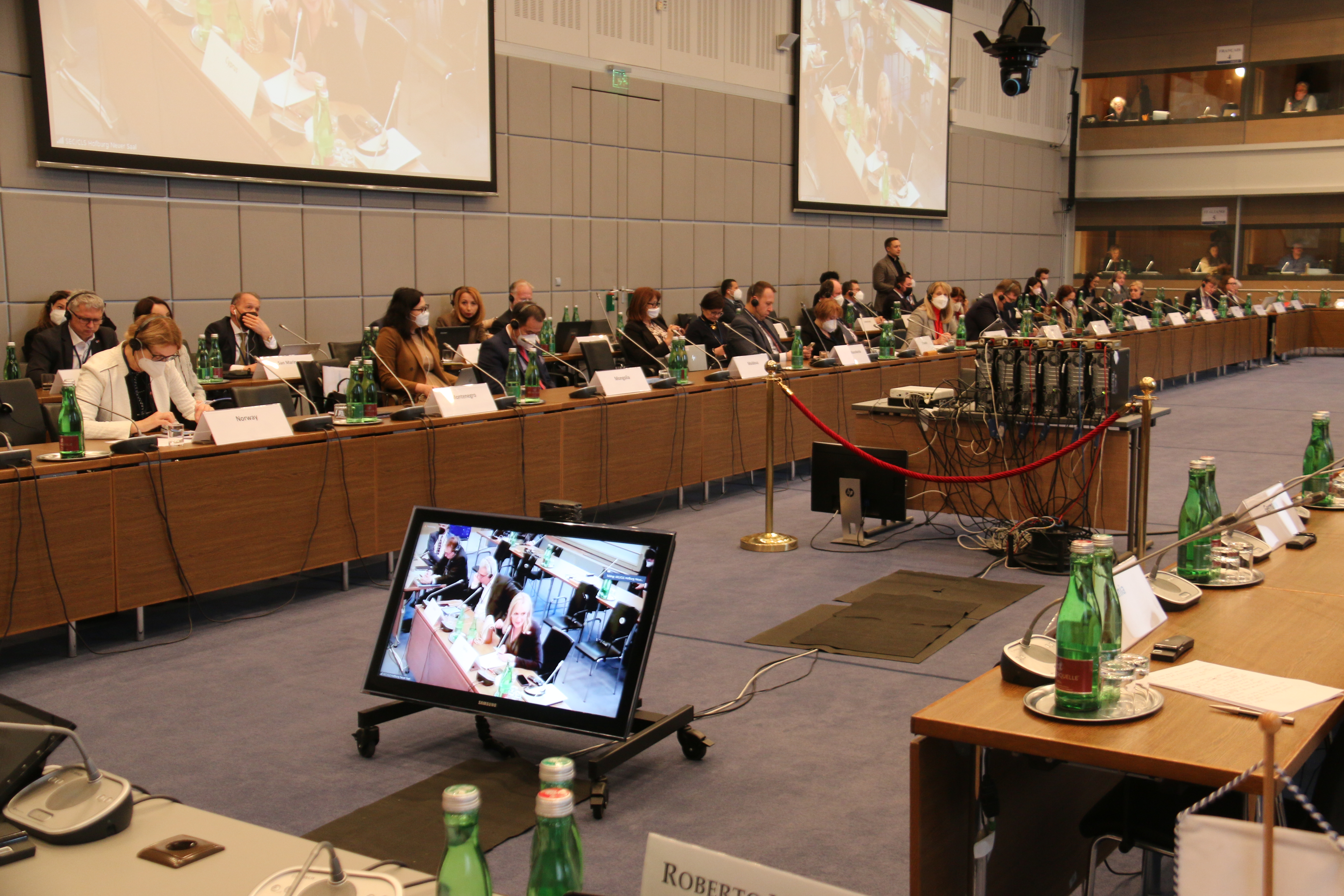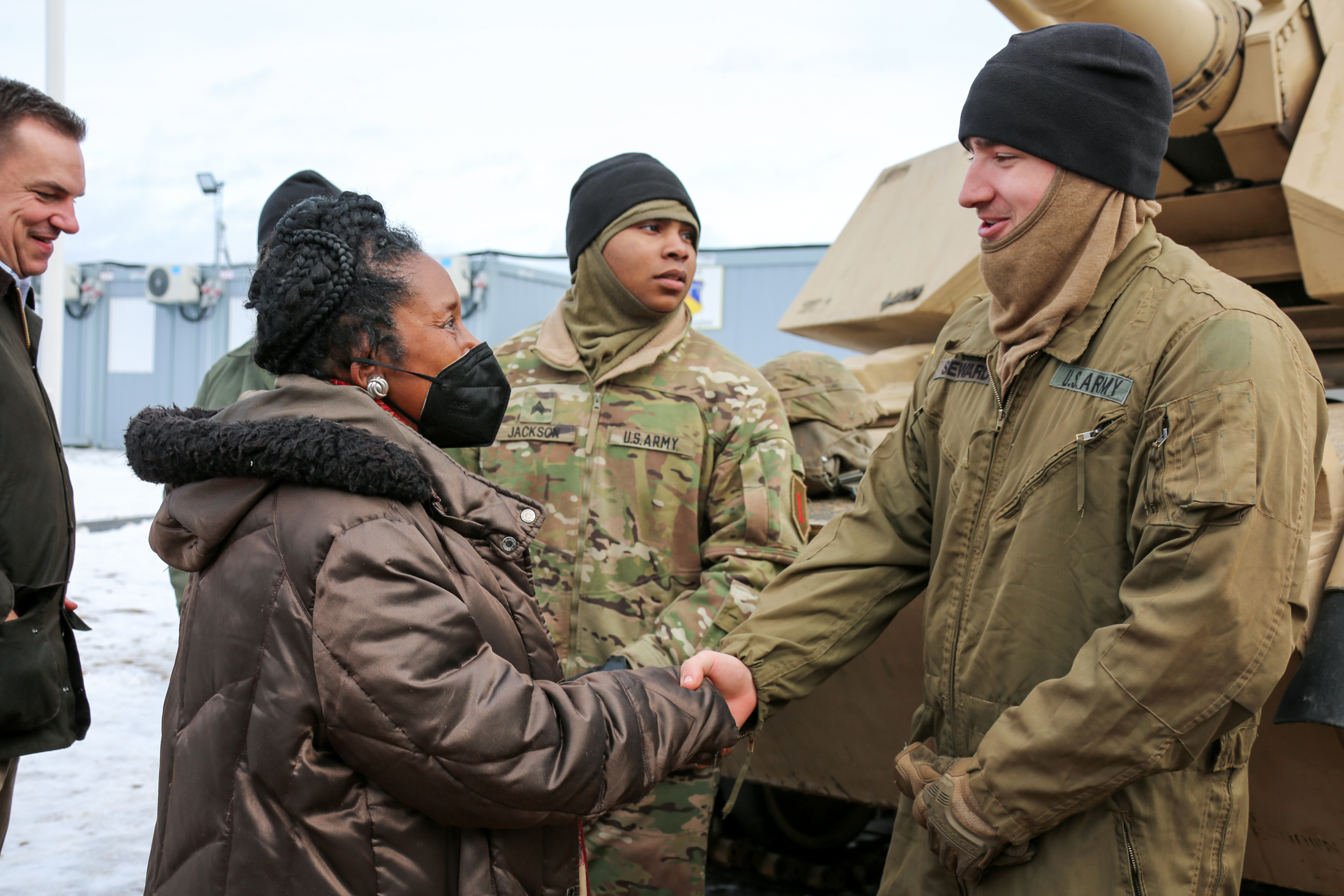By Ryn Hintz, Max Kampelman Fellow
From February 20 – 26, 2022, Helsinki Commission Co-Chairman Rep. Steve Cohen (TN-09) led a bipartisan Congressional delegation to the Winter Meeting of the OSCE Parliamentary Assembly (OSCE PA) in Vienna, where he served as the Head of the U.S. Delegation. Other participating Helsinki Commissioners included Ranking House Commissioner Rep. Joe Wilson (SC-02), and Commissioners Rep. Robert Aderholt (AL-04), Rep. Richard Hudson (NC-08), and Rep. Marc Veasey (TX-33). They were joined on the delegation by Rep. Sheila Jackson Lee (TX-18). Ranking Senate Commissioner Sen. Roger Wicker (MS) and Rep. Chris Smith (NJ-04) participated remotely as members of the U.S. Delegation.
The OSCE PA, consisting of 323 legislators from the 57 countries of the OSCE, has been particularly useful in defending democracy and promoting security in the face of numerous threats and challenges across the OSCE region. The Winter Meeting, held in a hybrid format due to ongoing but easing COVID restrictions, allows parliamentarians an opportunity to engage OSCE officials and diplomatic representatives, as well as to initiate work for the coming year.
Prior to the Winter Meeting, the delegation visited Lithuania to demonstrate the strong U.S. support for this close NATO ally, which not only faces security threats on its borders but also provides refuge to independent voices from Russia and Belarus.

OSCE PA Winter Meeting
The 2022 Winter Meeting coincided with Russian dictator Vladimir Putin’s large-scale invasion of neighboring Ukraine, a horrific escalation of a conflict that began with Russia’s illegal occupation of the Crimean Peninsula in 2014 and ongoing aggression in the eastern portion of Ukraine.
Ahead of the Winter Meeting, the OSCE PA Secretary General Roberto Montella and members of OSCE PA leadership (including Sen. Wicker as a Vice President and Rep. Hudson as Chair of the Committee on Political Affairs and Security) met in an emergency session and issued a statement condemning the Kremlin invasion as a “clear and gross violation of the most basic norms of international law as well as OSCE principles and commitments.”
The group also issued a subsequent statement standing “in solidarity with the people of Ukraine and its elected government” and noting the “extraordinary courage” exhibited by “civilians, the armed forces and national leaders, including President Volodymyr Zelensky.”
Statements condemning Vladimir Putin for the deliberate assault of Russian forces on Ukraine dominated the formal sessions of the meeting, despite an agenda originally designed to consider ongoing OSCE PA work on a wide range of issues. Co-Chairman Cohen spoke for the United States, decrying Putin’s claim that the Ukrainian government is led and run by Nazis.
In a poignant end to the Standing Committee’s second session, the Ukrainian Head of Delegation, Mykyta Poturaiev, reported on violence in his neighborhood of Kyiv and bid farewell as he sought to return to his family in Ukraine.
The 2022 Polish Chair-in-Office of the OSCE for 2022 outlined Poland’s priorities in an utterly transformed era in European security. During the general debate, nominally on the topic of “security guarantees and the indivisibility of security in Europe,” delegations resumed their near-universal condemnation of Putin’s invasion of Ukraine.
Rep. Hudson opened the meeting of the Committee on Political Affairs and Security by denouncing the invasion of one participating State by another, in total opposition of Helsinki principles. He also underlined the committee’s particular relevance in the context of the security crisis precipitated by Russia, a view reinforced by a panel of senior OSCE officials present as guest speakers.
Finally, Rep. Hudson moderated a debate on “heightened tensions in the OSCE area and the need for inter-parliamentary dialogue.” The debate focused heavily on the attack on Ukraine, with Sen.Wicker remotely joining those in Vienna condemning Russia’s outrageous behavior, and Rep. Jackson Lee forcefully urging members to recall the role of the Belarusian government in the events leading to the invasion.
In the economic and environmental affairs committee, Rep. Smith spoke alongside OSCE official Valiant Richey about their efforts as special representatives on human trafficking issues of the Parliamentary Assembly and the OSCE, respectively. They specifically discussed supply chains as they relate to human trafficking matters. Representative Wilson spoke for the United States in the subsequent debate.
In the committee dealing with democracy and human rights, Rep. Wilson condemned Russian human-rights violations in occupied Ukraine and in Russia itself, as well as ongoing repression in Belarus. Rep. Aderholt defended free media in his statement to the committee following presentations by recent Nobel laureate and Novaya Gazeta editor Dmitriy Muratov and OSCE Representative on Freedom of the Media Teresa Ribeiro.
On the margins of the Winter Meeting, the U.S. delegation gathered key parliamentarians from a range of participating States over dinner, fostering an opportunity for frank and candid exchanges of views on important topics confronting the OSCE. The event emphasized the depth of the U.S. commitment to European security, going beyond diplomatic representatives to include elected Members of Congress. The delegation also was briefed by diplomats representing the United States in the OSCE, including Ambassador Michael Carpenter, and held bilateral meetings with the heads of the Azerbaijani and Mongolian OSCE PA Delegations.

Visiting Lithuania
The delegation’s presence in Europe also afforded an opportunity to visit Lithuania to underscore U.S. support for a crucial NATO ally at a time of deep concern caused by Russian aggression.
In Vilnius, the delegation met with Lithuanian President Gitanas Nauseda, Prime Minister Ingrida Simonyte, Foreign Minister Gabrielius Landsbergis, and senior members of the Lithuanian Parliament (Seimas) to discuss the Russian assault on Ukraine, the deterioration of regional security, and Lithuania’s values-based foreign policy, including relations with China.
Officials emphasized to the delegation the game-changing nature of recent developments, especially the total capitulation of the Lukashenko regime in Belarus to Moscow. These actions resulted in a dramatically more challenging situation on Lithuania’s border, leaving the country essentially no warning should Putin choose to act against the Baltic states.
The delegation also visited the Pabrade Training Area, a Lithuanian initiative which provides facilities for U.S. and Allied military activities in the region. Members also met with Belarusians and Russians who had fled to Lithuania to avoid persecution, including Sviatlana Tsikhanouskaya and other opposition leaders, civil society organizations, and the media.





